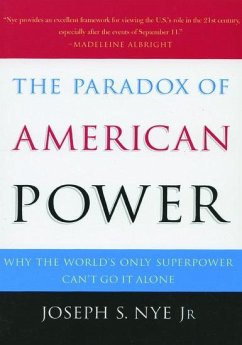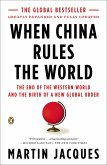Not since the Roman Empire has any nation had as much economic, cultural, and military power as the United States does today. Yet, as has become all too evident through the terrorist attacks of September 11th and the impending threat of the acquisition of nuclear weapons by Iraq, that power is not enough to solve global problems-like terrorism, environmental degradation, and the proliferation of weapons of mass destruction-without involving other nations. Here
Joseph S. Nye, Jr. focuses on the rise of these and other new challenges and explains clearly why America must adopt a more cooperative engagement with the rest of the world.
Hinweis: Dieser Artikel kann nur an eine deutsche Lieferadresse ausgeliefert werden.
Joseph S. Nye, Jr. focuses on the rise of these and other new challenges and explains clearly why America must adopt a more cooperative engagement with the rest of the world.
Hinweis: Dieser Artikel kann nur an eine deutsche Lieferadresse ausgeliefert werden.








